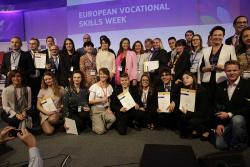Cedefop, the European Center for the Development of Vocational Training, is looking for ambassadors to disseminate activities aimed at reducing early leaving from vocational education and training.
The announcement is addressed to a wide range of people involved in the education process - from political decision makers, to learning providers and experts. Ambassadors are involved in developing a network of contacts of representatives from various countries, as well as providing a platform to exchange experiences and good practices on addressing early leaving from vocational education.
Additional information and the application form can be found at the CEDEFOP website.
CEDEFOOP has developed a range of tools, practical tips and good practices aimed at addressing early school leaving from vocational education and training. These materials are available from the CEDEFOP website.







